

Inside the world of… How SHORT-TERMISM encourages our productivity shortfall – read this unnoticed and compelling explanation ….
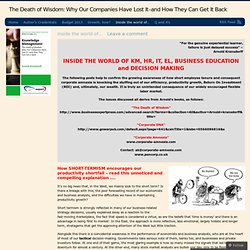
It’s no big news that, in the West, we mainly look to the short term? Comcast on hellish customer service call: Rep did 'what we trained him' to do. How to win by not losing. Leadership is Not Enough. Leadership is Not Enough.
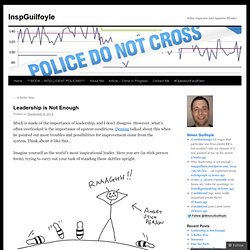
6 Management Lessons That Everyone Should Know. #2 Is Priceless. Urt rules on disability and work-related stress. The Court of Appeal has overturned findings by the Employment Appeal Tribunal (EAT) in a discrimination case between an employee suffering from work-related stress and his employer, which relied on the advice of its external occupational health advisers.
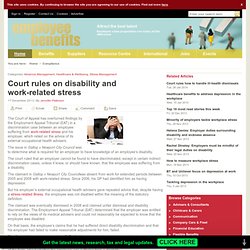
The issue in Gallop v Newport City Council was to determine what is required for an employer to have knowledge of an employee’s disability. The court ruled that an employer cannot be found to have discriminated, except in certain indirect discrimination cases, unless it knew, or should have known, that the employee was suffering from a disability. The claimant in Gallop v Newport City Councilwas absent from work for extended periods between 2005 and 2008 with work-related stress. Since 2006, his GP had identified him as having depression. But his employer’s external occupational health advisers gave repeated advice that, despite having a stress-related illness, the employee was not disabled within the meaning of the statutory definition. Hi, I need some help filing the CT600 form via HMRC online.
Brilliant 1981 Article: “Why Japanese factories work” – Relevant for Healthcare in 2013. The year is 1981.
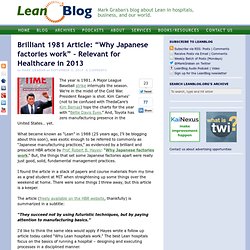
A Major League Baseball strike interrupts the season. We’re in the midst of the Cold War. President Reagan is shot. MarkGraban : Robert Hayes 1981 HBR article... Why a medieval peasant got more vacation time than you. Life for the medieval peasant was certainly no picnic.
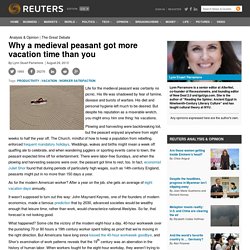
His life was shadowed by fear of famine, disease and bursts of warfare. His diet and personal hygiene left much to be desired. But despite his reputation as a miserable wretch, you might envy him one thing: his vacations. Plowing and harvesting were backbreaking toil, but the peasant enjoyed anywhere from eight weeks to half the year off. The Church, mindful of how to keep a population from rebelling, enforced frequent mandatory holidays.
As for the modern American worker? It wasn’t supposed to turn out this way: John Maynard Keynes, one of the founders of modern economics, made a famous prediction that by 2030, advanced societies would be wealthy enough that leisure time, rather than work, would characterize national lifestyles. What happened? Fast-forward to the 21st century, and the U.S. is the only advanced country with no national vacation policy whatsoever. Some blame the American worker for not taking what is her due. Abraham Maslow and the pyramid that beguiled business. A. H. Maslow (1943) A Theory of Human Motivation. Classics in the History of Psychology An internet resource developed byChristopher D.
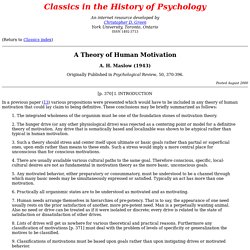
GreenYork University, Toronto, OntarioISSN 1492-3713 (Return to Classics index) A Theory of Human Motivation A. Originally Published in Psychological Review, 50, 370-396. Posted August 2000. Motivation, let's get real for a moment. Dan Pink and Ryan & Deci are quoted a lot when we talk about motivation – I include myself in that and this is good – they have a lot of research to back up everything they say.
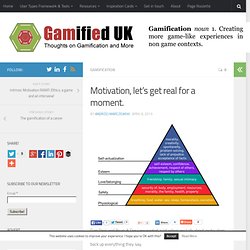
The basic quote usually revolves around. Money is not a good motivator. Mastery, Purpose, Autonomy and in some quoted cases Relatedness are what we need. They are intrinsic motivators, money is not. True. W. Edwards Deming on Intrinsic Motivation. Reward Firefighting And You'll Create A Culture Of Arsonists. Beware the Sirens of Management Pseudo-Science - Freek Vermeulen. Management is not an exact science, they say.

And I guess most things that involve the study of human behavior cannot be. Dismantling hierarchies. Can organizations still function if we dismantle hierarchies?
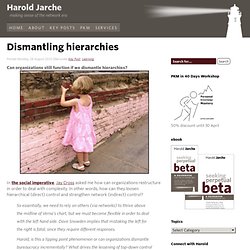
In the social imperative, Jay Cross asked me how can organizations restructure in order to deal with complexity. In other words, how can they loosen hierarchical (direct) control and strengthen network (indirect) control? So essentially, we need to rely on others (via networks) to thrive above the midline of Verna’s chart, but we must become flexible in order to deal with the left hand side. Capable People Blog. I was always happy with the accepted way that risk was defined.
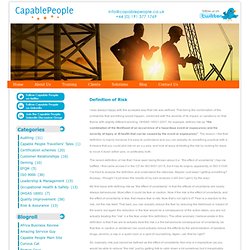
That being the combination of the probability that something would happen, combined with the severity of its impact, or variations on that theme with slightly different wording. OHSAS 18001:2007, for example, defines risk as “the combination of the likelihood of an occurrence of a hazardous event or exposure(s) and the severity of injury or ill health that can be caused by the event or exposure(s)”. The reason I like that definition is mainly because it is easy to understand and you can actually do something practical with it.
It means that you could plot risk on an x-y axis, and look at ways at treating the risk by looking for ways to move it down either axis, or preferably both. Managing risk - trust versus transparency. I had a conversation with a public sector contact this week about the extent to which monitoring ceased to become useful and started to become intrusive and destructive. It introduced an interesting angle to the debate on the management of risk within a system of work The thrust of our discussion centred around a business process that had historically been subject to quite a high level of scrutiny and audit. Right now the organisation concerned was thinking about easing back on the level of sampling for audit purposes in the hope that placing more trust in the abilities of the people would actually have a more positive effect – it would also deliver an added cost saving by reducing the surveillance and monitoring overhead As a principle it was certainly worth a discussion.
Over-scrutiny certainly can have negative consequences. Adland : New Venn Diagram on old truth. Top tips for effective delegation. How Optimism Can Hurt Your Team - Management Tip of the Day - August 23, 2013. Learn How to Lead in a Crisis - Management Tip of the Day - August 08, 2013.